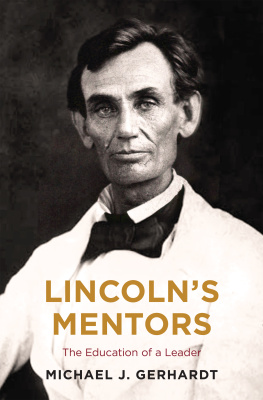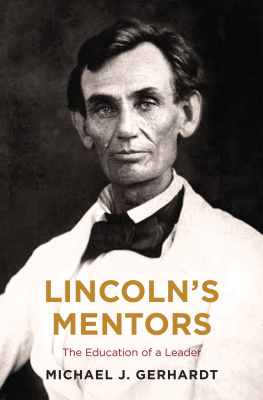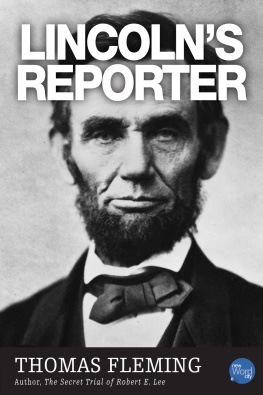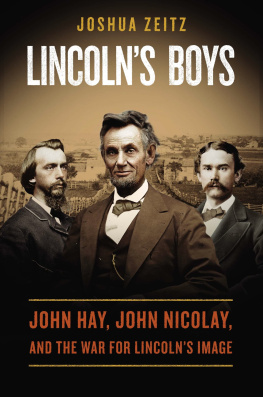Michael J. Gerhardt - Lincolns Mentors
Here you can read online Michael J. Gerhardt - Lincolns Mentors full text of the book (entire story) in english for free. Download pdf and epub, get meaning, cover and reviews about this ebook. year: 2020, publisher: Custom House, genre: Non-fiction. Description of the work, (preface) as well as reviews are available. Best literature library LitArk.com created for fans of good reading and offers a wide selection of genres:
Romance novel
Science fiction
Adventure
Detective
Science
History
Home and family
Prose
Art
Politics
Computer
Non-fiction
Religion
Business
Children
Humor
Choose a favorite category and find really read worthwhile books. Enjoy immersion in the world of imagination, feel the emotions of the characters or learn something new for yourself, make an fascinating discovery.
- Book:Lincolns Mentors
- Author:
- Publisher:Custom House
- Genre:
- Year:2020
- Rating:3 / 5
- Favourites:Add to favourites
- Your mark:
- 60
- 1
- 2
- 3
- 4
- 5
Lincolns Mentors: summary, description and annotation
We offer to read an annotation, description, summary or preface (depends on what the author of the book "Lincolns Mentors" wrote himself). If you haven't found the necessary information about the book — write in the comments, we will try to find it.
Lincolns Mentors — read online for free the complete book (whole text) full work
Below is the text of the book, divided by pages. System saving the place of the last page read, allows you to conveniently read the book "Lincolns Mentors" online for free, without having to search again every time where you left off. Put a bookmark, and you can go to the page where you finished reading at any time.
Font size:
Interval:
Bookmark:
IN MEMORY OF MY MOTHER, SHIVIA LEE GERHARDT (19292020). HER SELFLESS DEVOTION, LOVE, PATIENCE, COURAGE, AND SUPPORT ARE ENDURING BLESSINGS AND MODELS TO US ALL.
Upon the subject of education, not presuming to dictate any plan or system respecting it, I can only say that I view it as the most important subject we as a people can be engaged in.
A BRAHAM L INCOLN , First Campaign Speech, March 9, 1832
In times of crisis, Americans look to Abraham Lincoln. That impulse has been especially strong in the year 2020, as the nation has simultaneously grappled with a pandemic costing more than a quarter of a million American lives, a recession causing unemployment exceeding Depression-level numbers, mass protests against racism and police brutality, waves of violence across the land, and an impending presidential election bound to inflame divisions among Americas public. For such a fraught time, Lincolns eloquence, steady hand, and determination in leading an embattled nation to overcome secession, brutal civil war, and a severely weakened economy have become touchstones for Americans yearning for unifying, calming leadership.
Yet, at the heart of Abraham Lincolns successes and story is a mystery that has intrigued historians and admirers. How did a man with no executive experience and only a single term in Congress become Americas greatest president? That is the question nearly everyone asks about Lincoln. This book suggests an answer. The most common view of Lincoln as a political genius does not give Lincoln his due. To be certain, his political acumen and soaring rhetoric are matched by few others in American history. But Lincoln had a handful of men to whom he turned for guidance and inspiration throughout his life. Even as a young man, Lincoln knew enough to know he needed mentors. He could not learn in isolation all the skills he needed to become a great leader.
Consider, for example, the popular depiction of Abraham Lincoln in the years 18491856 as lost, alone, and in desperate need of inspiration. True, when Lincoln returned home to Springfield, Illinois, after his seemingly lackluster two years in the U.S. House of Representatives, his prospects were bleak. After years of struggling to make a mark in national politics, he worried that he had failed and that his political career was over. The Whig Party opposed nominating him for a second term, in spite of his loyal service to the party for more than a decade. He did not want to leave office, but the strong stance he had taken in opposition to the Mexican War had eroded his local support, given that Illinois had been among the states with the largest numbers of volunteers for the conflict. Many of the people back home, including his fellow Whigs, mocked him as Spotty Lincoln, a nickname they coined after he failed to persuade the House to approve a resolution criticizing President James Polk for lying to Congress about the exact spot where Mexicans had fired the first shots that started the Mexican War. Lincoln had campaigned for Zachary Taylor in 1848, but, once in office, Taylor denied his application to become the commissioner of the Land Office. Worse still, Taylor died in 1850, elevating to the presidency his vice president, Millard Fillmore, a Whig who did not take Lincoln seriously.
By the time Fillmore left office in 1853, Lincoln had to confront the fact that the Whig Party was dying. Its demise left him without a party apparatus to sustain his political future. Dispirited, he turned his attention to reviving his law practice with William Herndon, building it into a highly respected but ultimately not very lucrative firm. His dreams of becoming a great lawyer were crushed when the nationally renowned Edwin Stanton of Ohio dismissed him from the biggest case of his career in 1855.
As Lincolns fortunes dimmed in the 1850s, his longtime Democratic rival, Stephen Douglas, had become a senator for Lincolns home state of Illinois and a rapidly rising star in national politics. In 1854, Douglas took center stage nationally in drafting and securing passage of the controversial Kansas-Nebraska Act, a law that allowed voters in the territories of Kansas and Nebraska to decide for themselves whether or not to permit slavery within their borders. As violence erupted in Kansas and President Franklin Pierce ordered the federal government to support proslavery forces there, Lincoln did little. Home was no respite. His sagging prospects exacerbated tensions with his wife, Mary Todd, who had great ambitions for him. Seemingly adrift, he read Euclid to sharpen his mind. He worried that he would never make a lasting mark on the world. His friends worried about his sanity.
Yet Lincolns vexation was of a deliberative sort, a pausealbeit forced by circumstanceand not a surrender. His aspirations had not eroded, nor had much of his support for high office. In fact, his development as a serious presidential contender had begun many years earlier, and in 18491856, Lincoln was not so much reinventing himself as adapting the lessons he had learned over more than two decades in politics and law. In every critical phase of his life, including those seven years, Lincoln followed the same strategy, and it was not to turn completely inward. Besides reading voraciously to learn more about political philosophy, issues, and history of concern to him, he looked to others for guidance on the skills, vision, and strategies he needed in order to achieve his ambitions.
Certainly, the books, newspapers, plays, and poetry he read offered him a foundation that went beyond the accumulation of facts and phrases; they filled the vacuum left by the traumatizing absence of his father and the death of his mother when he was nine. An older, wiser Lincoln, who had benefited from years of self-education, noted that a capacity, and taste, for reading, gives access to what has already been discovered by others. It is the key, or one of the keys, to the already solved problems. And not only so. It gives a relish, and a facility, for successfully pursuing the unsolved ones. Books, unlike people, would never let him down. Yet he also realized that the words he read on the page could tell him only so much. To ascend in the tumultuous world of politics required a different sort of study.
Many people who knew Lincoln in his middle to late years spoke of how he read purely for utilitarian purposes, forgoing the pleasures of fiction. Even his study of poetry and drama was in pursuit of mastering the cadence of public speaking and better understanding human nature. Both as a boy and later in his life, Lincoln was intrigued with the founding of the republic, particularly with stories of the great men who were responsible for it, giants who still tread the earth in his lifetime. The books and speeches he read and reread sparked a lifelong fascination with politics, rhetoric, and the Constitution, and the debates in Illinois and throughout the nation were extensions of those the Founders had had in framing and ratifying the Constitution. Those men were hardly a distant memory for Lincoln and his generation. The nation had elected its first president only twenty years before Lincoln was born.
Lincolns ambition to make an enduring mark on the world led him to five men, whose experiences, political insights, vision of the Constitution, example, and guidance helped him navigate the path to the presidency. From these five, Lincoln learned valuable lessons on how to master party politics, to campaign for office, to understand and use executive power, to negotiate, to manage a Cabinet, to craft a speech, and to develop policies and a constitutional vision that fit the times and became his most enduring legacy. In the nineteenth century, it was common, particularly for enterprising young men, to find flesh-and-blood mentors, men who would serve not only as father figures but also as teachers of the skills they needed to succeed. Lincolns mentors were something different. For him, mentors were not just the men he actually interacted with but also sources of inspiration and instructionmen to be emulated, men whose mistakes he was determined to avoid, and men with whom he could argue or take issue without fear of alienation or retaliation. There is no reliable evidence that he ever met two of the men who so profoundly helped him steer his course to the White House. Yet Lincoln referred to these two men as mentors, seeing them as far more than inspirational figures. I have followed Lincolns lead.
Font size:
Interval:
Bookmark:
Similar books «Lincolns Mentors»
Look at similar books to Lincolns Mentors. We have selected literature similar in name and meaning in the hope of providing readers with more options to find new, interesting, not yet read works.
Discussion, reviews of the book Lincolns Mentors and just readers' own opinions. Leave your comments, write what you think about the work, its meaning or the main characters. Specify what exactly you liked and what you didn't like, and why you think so.









